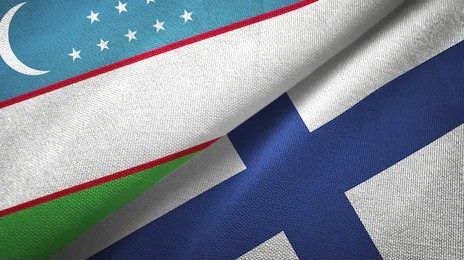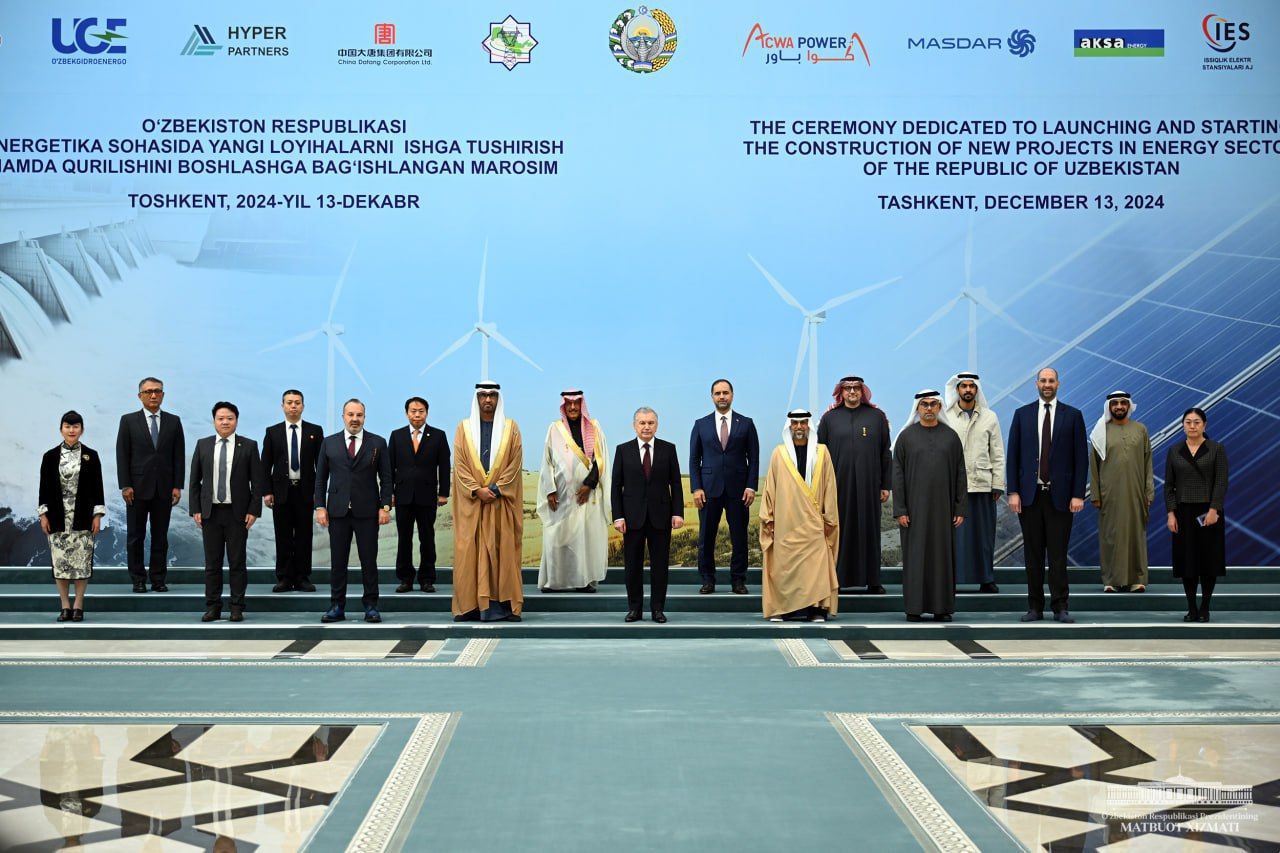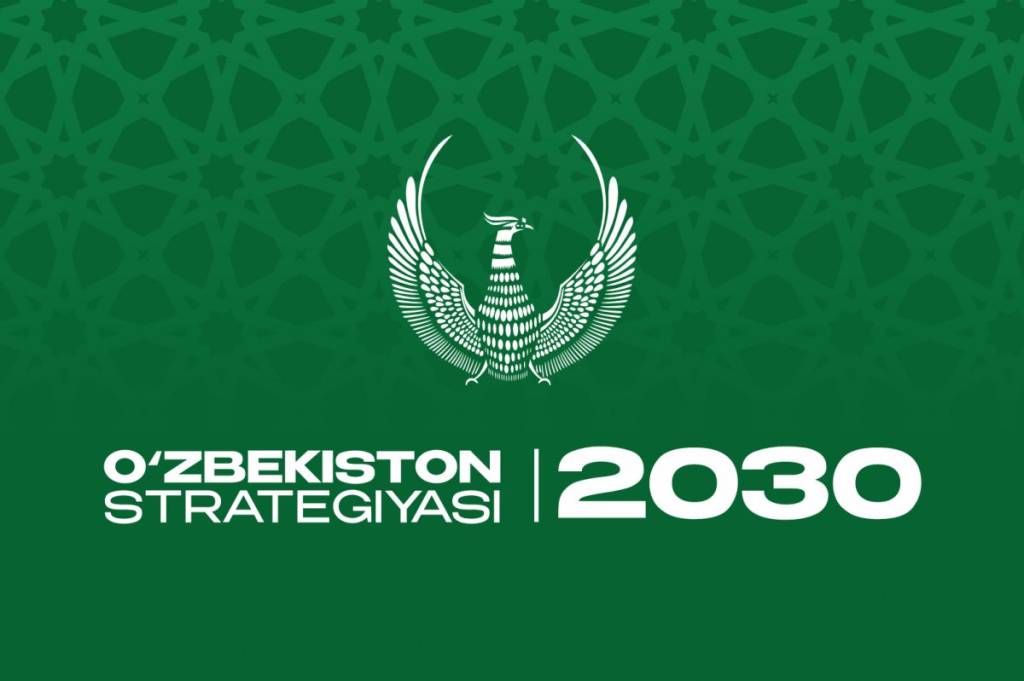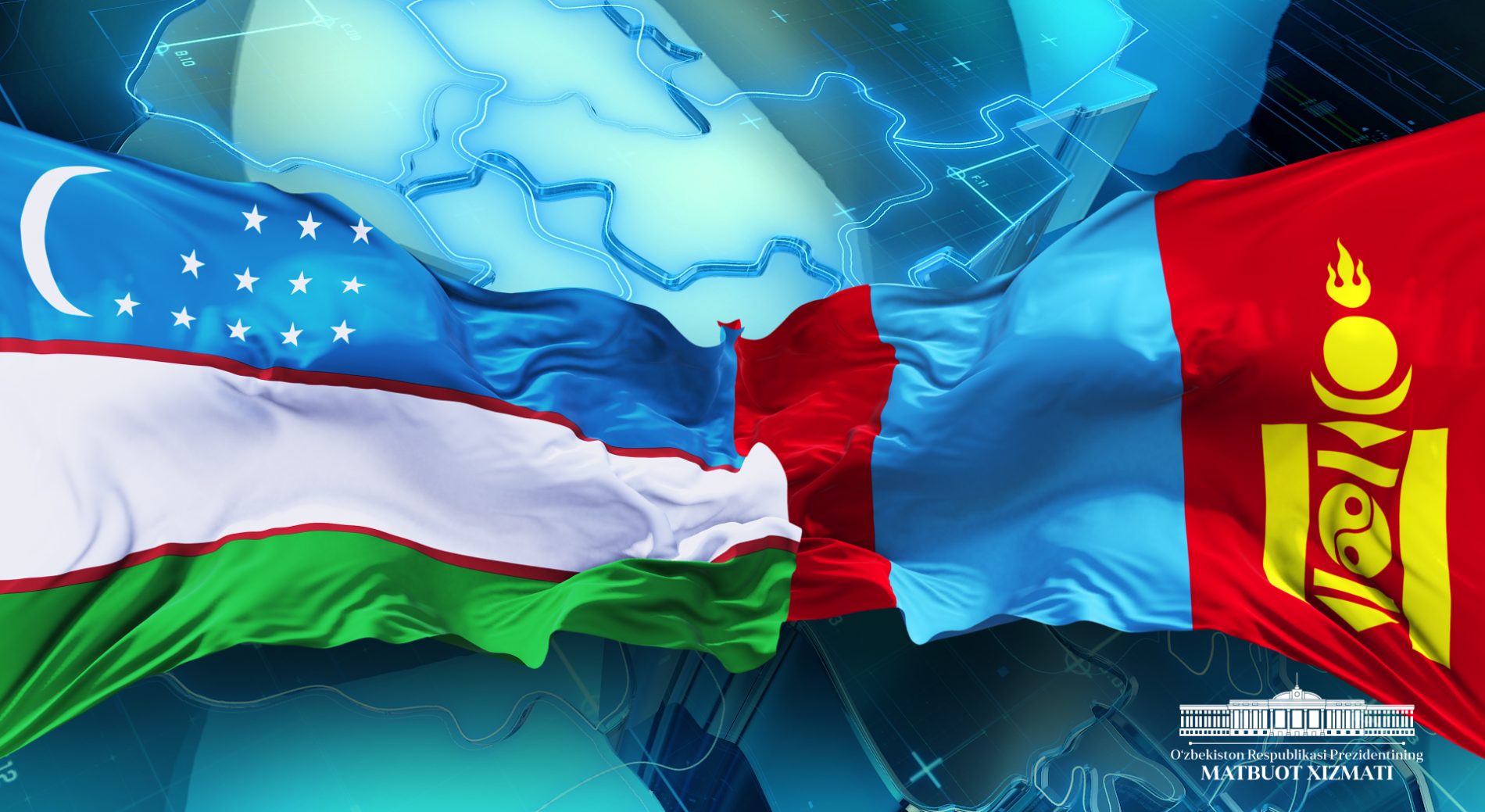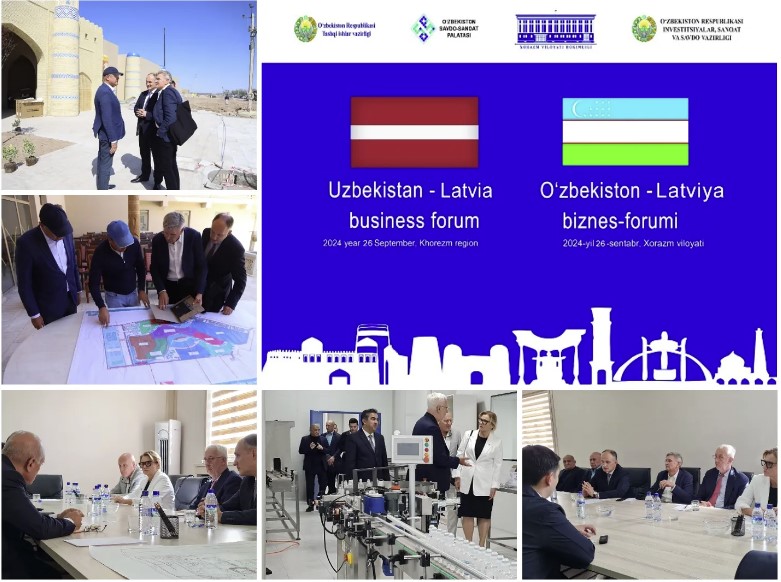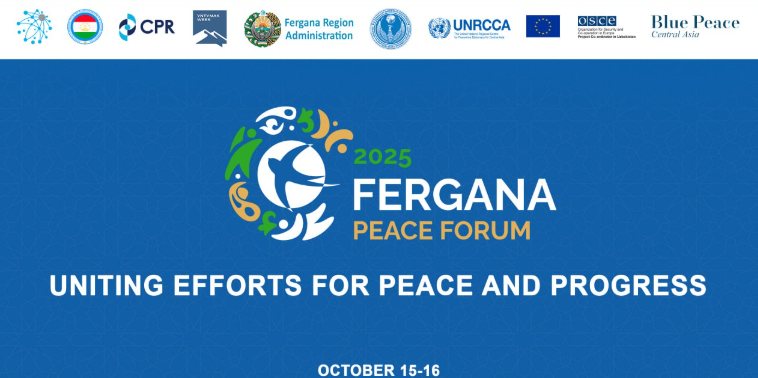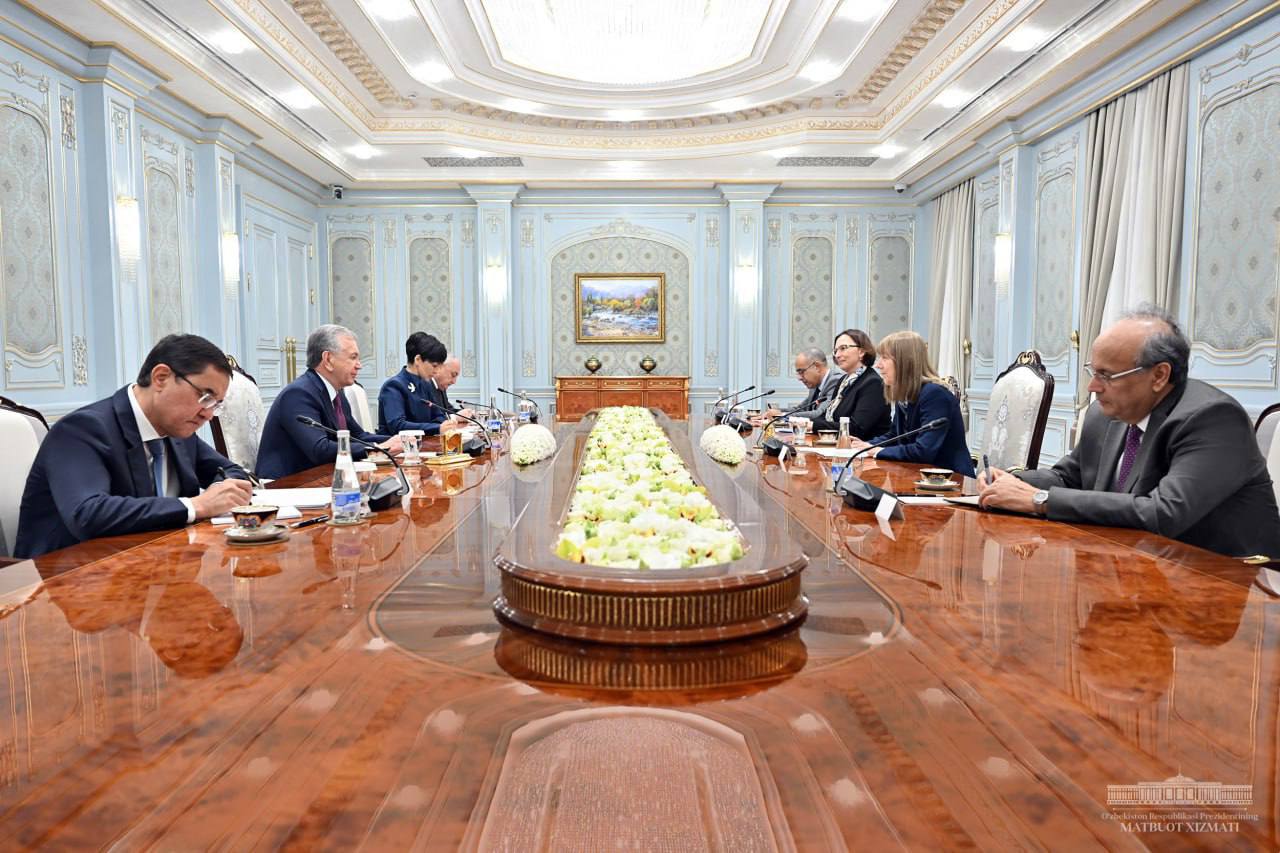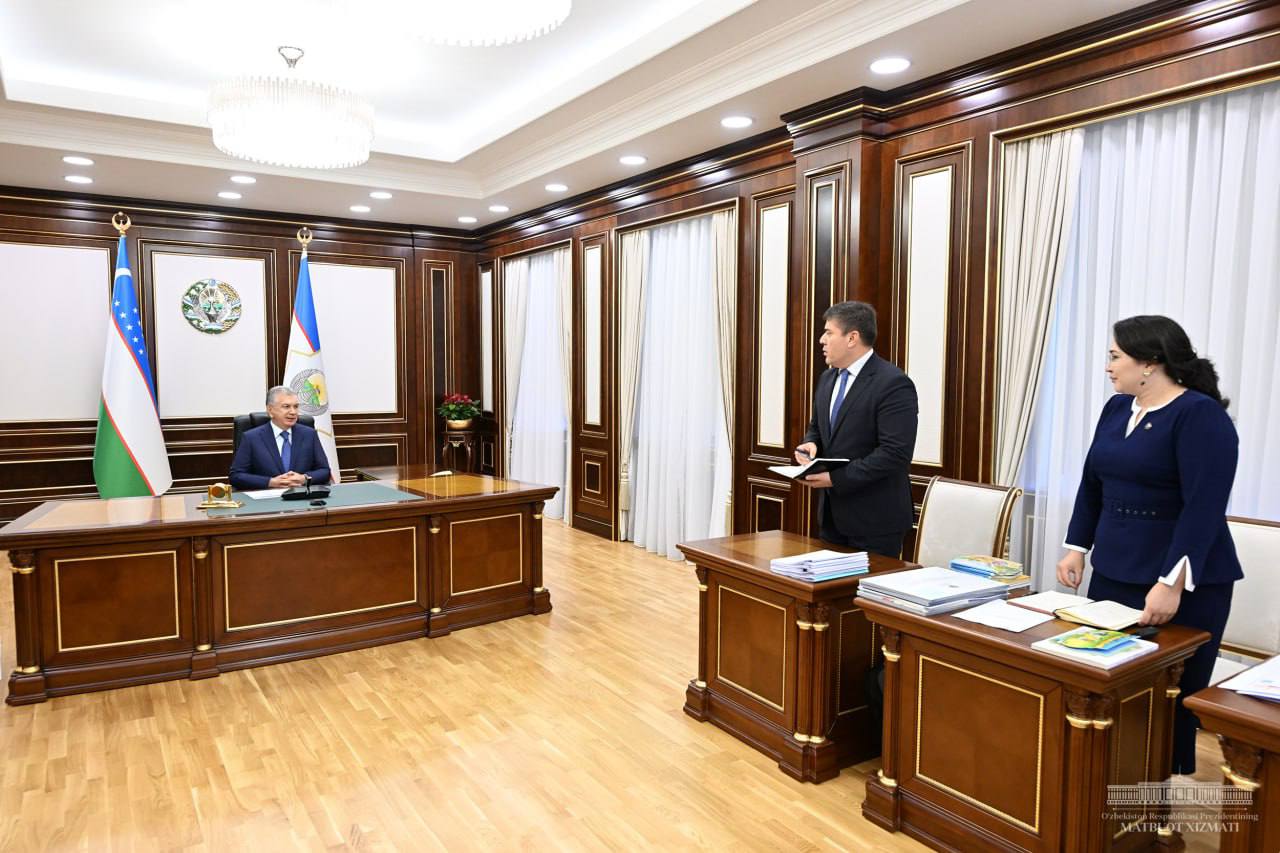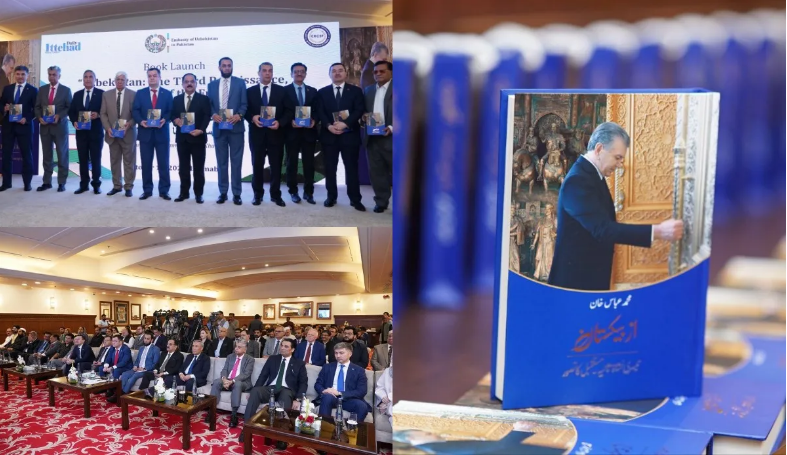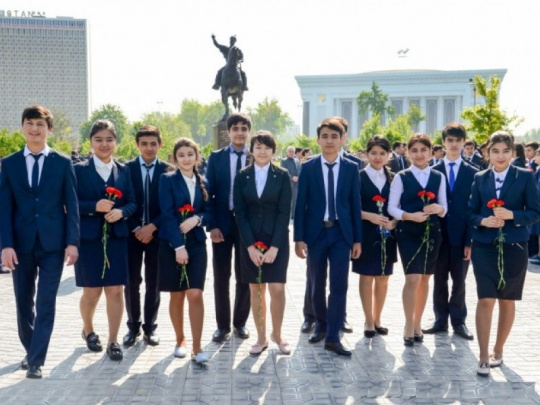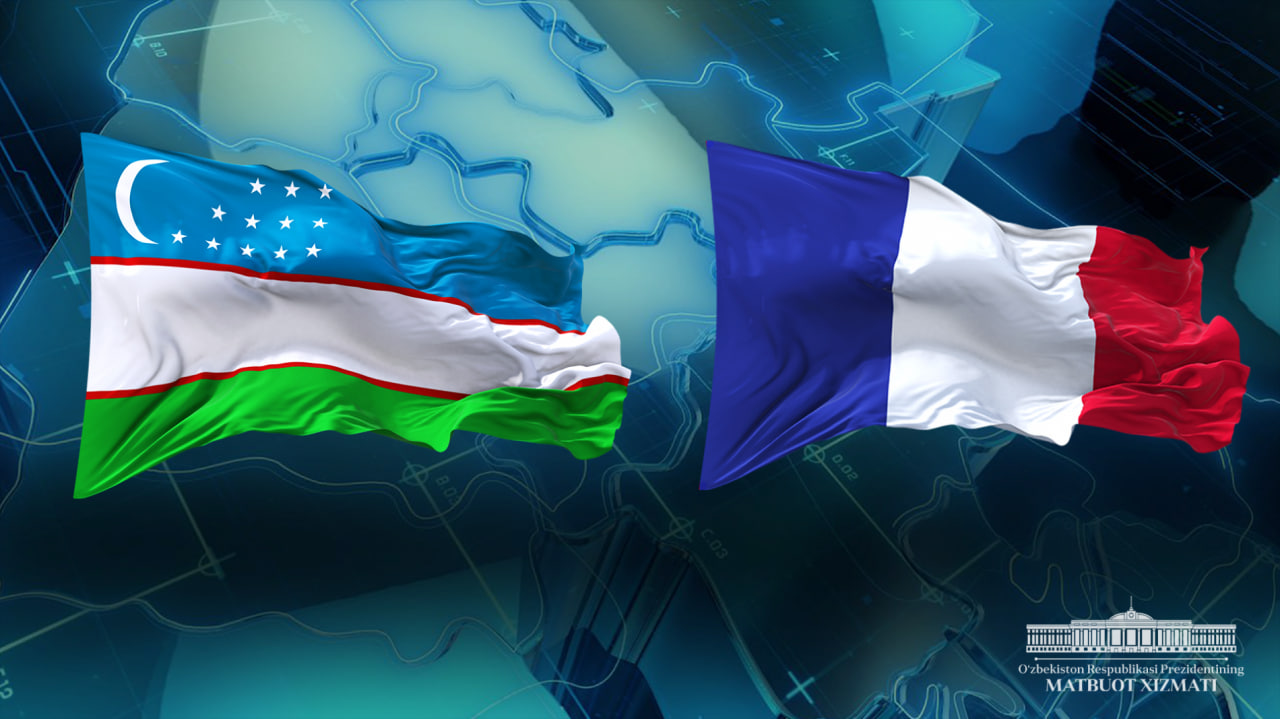Phone
Consular Issues
Phone
Uzbekistan news
We recommend
Uzbekistan and Finland: Digital Groundwater Modeling as a Contribution to Climate Resilience in Central Asia
📅 06.11.2025
Amid growing water scarcity and climate instability in Central Asia, Uzbekistan and Finland are implementing a unique form of scientific cooperation that combines digital innovation with sustainable water resource management.
In 2021, the Ministry of Mining Industry and Geology of the Republic of Uzbekistan and the Geological Survey of Finland (GTK) signed a Memorandum of Understanding aimed at the rational development of natural resources through advanced technologies. Today, this project stands as an example of scientific diplomacy that unites European expertise with Uzbekistan’s potential.
From Paper Maps to Digital Models.
For many years, hydrogeological maps of Uzbekistan existed only in paper form. Within the framework of the joint project, they were digitized using the ArcGIS platform, creating a unified national groundwater database. This digital transformation enables specialists to monitor aquifer conditions, analyze water balances, and forecast the impacts of climate change.
Finnish experts conducted a series of training programs for Uzbek specialists, introducing modern methods of digital mapping and data processing. This strengthened the professional capacity of the sector and laid the foundation for scientifically grounded and transparent water resource management.
Scientific Practice: Experimental Site in Akhangaran.
An experimental site was established in the Akhangaran district of the Tashkent region, where joint research teams conducted geophysical studies and developed digital models of groundwater flow. The obtained data help predict groundwater levels, plan water supply systems, and identify areas vulnerable to drought.
The use of the MODFLOW software package made it possible to create models that provide scientifically based solutions for water resource allocation — particularly important for regions with limited water reserves.
European Partnership for Climate Resilience.
Cooperation with Finland is part of a broader European agenda aimed at supporting climate adaptation and sustainable development in Central Asia. By combining European technologies with Uzbekistan’s scientific resources, the project demonstrates how international partnerships can strengthen ecological security and water stability.
The results of the joint work were published in the journal Water (Scopus) under the title “Assessing Climate Change Impacts on Groundwater Recharge and Storage Using MODFLOW in the Akhangaran River Alluvial Aquifer, Eastern Uzbekistan.”
Furthermore, new areas of cooperation have opened — with the University of Padua (Italy) in geological risk monitoring, and with the Belarusian Scientific and Production Center for Geology in groundwater observation.
Looking Ahead.
The joint project between Uzbekistan and Finland is more than a transfer of technology — it represents a step toward creating a new culture of rational water use and responsible climate action. The establishment of a national digital hydrogeological database will become a key element in the country’s environmentally sustainable development.
As Europe and Central Asia continue to strengthen cooperation in water, energy, and climate, the Uzbek-Finnish project serves as a model of how scientific initiatives can deliver tangible environmental and social benefits.
18 new energy facilities commissioned, 6 facilities are launched for construction
📅 16.12.2024
President of the Republic of Uzbekistan Shavkat Mirziyoyev on December 13 took part in a solemn ceremony dedicated to the launch of new energy capacities and the beginning of construction of a number of facilities.
These projects are part of a large-scale work aimed at strengthening the potential of the country's energy system. Last December, five solar and one wind power plants were put into operation. Many new projects were launched during the Head of State's visits to the regions.
Today, 24 projects worth more than $7 billion have been launched. In particular, in Bukhara, Navoi, Namangan and Tashkent regions, 5 solar and wind power plants with a total capacity of about 2.3 thousand megawatts, as well as 5 high-voltage substations have been connected to the network.
For the first time in Uzbekistan, an energy storage system with a capacity of 300 megawatts was created in Andijan and Fergana. A 400 megawatt power plant was put into operation in Kashkadarya, and a modern cogeneration plant was put into operation in Tashkent, and in Andijan, Surkhandarya and Tashkent regions - four small hydroelectric power plants.
In addition, construction of 6 energy facilities with a total capacity of 2.5 gigawatts has started in Fergana, Samarkand, Navoi, Tashkent regions and Tashkent city.
These new projects will generate an additional 9.5 billion kilowatt hours of electricity, save 2.5 billion cubic meters of natural gas and prevent the emission of 4.6 million tons of harmful gases in the coming years.
Most importantly, over 4 million households will be provided with uninterrupted and clean energy.
This will also set the stage for $4 billion worth of value creation in other sectors of the economy.
In total, in 2025, our country will produce 84 billion kilowatt-hours of electricity, which is 25 billion kilowatt hours or 1.5 times more compared to 2016.
Speaking at the ceremony, President Shavkat Mirziyoyev emphasized that all these projects are implemented through foreign direct investment. Gratitude was expressed to companies from the United Arab Emirates, Saudi Arabia, Türkiye, China and Germany, as well as international institutions such as the Asian Development Bank, the Asian Infrastructure Investment Bank, the Islamic Development Bank, the European Bank for Reconstruction and Development and the World Bank for their fruitful cooperation.
Thanks to the open access of the private sector, Uzbekistan's energy sector has attracted about $20 billion of foreign direct investment over the past five years.
Twenty-four independent energy producers have started to operate in the sector, where previously only the state was present.
In particular, large solar and wind power plants with a total capacity of 3,500 megawatts, equivalent to 10 billion kilowatt-hours, were launched in the green energy sector. This increased the share of “green energy” in the energy system to 16 percent.
As is known, last year the country's GDP reached the historic figure of $100 billion for the first time. By 2030, Uzbekistan's economy should grow to $200 billion.
This will increase the demand for electricity by 1.5 times over the next five years. In addition, under the Paris Agreement, it is planned to reduce harmful gas emissions by 35 percent by 2030.
The President outlined the priority areas of work in the energy sector.
First, 19 thousand megawatts of additional “green capacity” will be built by 2030, and the share of renewable energy will be increased to 54 percent. Already by 2025, 18 solar and wind power plants with a capacity of 3.4 thousand megawatts and energy storage systems with a capacity of 1.8 thousand megawatts are planned. This will increase green energy production to 12 billion kilowatt-hours next year. Also within two years, a large-scale project will be implemented in cooperation with private partners to create more than 2,000 small and micro-hydroelectric power plants.
Second, liberalization of the electricity market will continue. By the end of next year, it is planned to create a competitive wholesale electricity market. Public-private partnership will be introduced in the sphere of energy distribution, and $4 billion of investments will be attracted for the modernization of networks. The first project of transferring the management of regional power grids to the private sector has been developed in Samarkand region, and an international tender has been announced.
Third, the expansion of international cooperation in the field of “green energy”. Within COP-29, agreements were signed with Kazakhstan, Azerbaijan and Saudi Arabia on joint export of “green energy” to Europe. Jointly with neighboring countries a single platform has been launched to ensure the stability of the regional energy system.
Fourth, development of “green energy” as a new driver for other sectors of the economy and improvement of living standards of the population.
Solar panels with a total capacity of 1,000 megawatts have already been installed, which makes it possible to produce 1.5 billion kilowatt-hours of electricity annually. Support for “green” initiatives will continue with the introduction of dual education for the training of specialists.
- Today's event opens a new page in the history of our country's energy sector. These projects will not only ensure economic growth, but also will create an environmentally friendly and sustainable future for our descendants - said Shavkat Mirziyoyev.
The ceremony was addressed by Minister of Energy and Infrastructure of the United Arab Emirates Suhail Mohamed Al Mazrouei, Minister of Energy and Natural Resources of Türkiye Alparslan Bayraktar and Minister of Energy of the Kingdom of Saudi Arabia Prince Abdulaziz bin Salman Al Saud.
By pressing a symbolic switch, President Shavkat Mirziyoyev launched the operation of 18 energy facilities and construction of 6 new projects.
“Uzbekistan – 2030” Strategy: Updates and refinement of target indicators
📅 28.01.2026
“Uzbekistan - 2030” strategy, adopted on 11 September 2023, identifies sustainable economic growth, the establishment of modern education, healthcare and social protection systems, creation of favorable environmental conditions, building a just and modern state and guaranteed national sovereignty and security as its priority areas. At the core of all reforms is the aim to increase citizens’ welfare, strengthen public trust in the state and ensure confidence in the future. The strategy represents a shift from goal-setting to results-based management, with clear accountability, measurable outcomes and linked financing.
Since its adoption, Uzbekistan has achieved significant progress. Between 2023 and 2025, nominal GDP rose from USD 107.5 billion to USD 140 billion, while exports, foreign investment and innovative activity also grew. Social indicators reflect the reforms’ impact: unemployment fell from 6.8% to 4.9% and poverty decreased from 11% to 6.8%.
What are the reasons for updating the “Uzbekistan - 2030” Strategy?
The need to accelerate the country’s further development has prompted the update of the strategy and its target indicators. The “Uzbekistan - 2030” Strategy has been revised in light of both external and internal factors.
External factors include the global geopolitical environment, international economic trends, technological innovations, environmental and natural changes and the growing demand for energy and water resources. Internal factors encompass demographic growth, urbanization and migration, which require strengthening institutional quality and improving governance efficiency.
In response to these challenges, a draft of the “Uzbekistan - 2030” Strategy for 2026-2030 has been developed and published for nationwide public discussion.
Within the updated Strategy, while retaining the same five priorities and 100 goals, certain tasks and performance indicators have been revised. Many of the previously established targets have already been achieved and new objectives have been added, resulting in an expanded and updated set of performance indicators. Moreover, the document specifies the responsible ministries and agencies as well as the concrete funding sources required to achieve each goal.
In which areas do the reforms provide “mechanisms for change”?
Economy. The largest number of tasks and performance indicators fall under “II. Ensuring the well-being of the population through sustainable economic growth.” The Strategy sets a target GDP of USD 240 billion by 2030 through measures such as maintaining annual inflation at 5–6%, ensuring fiscal stability, enhancing the country’s investment attractiveness, efficiently utilizing domestic raw materials and developing high-tech-based industry and services. The plan also emphasizes deepening Uzbekistan’s integration into global transport and logistics networks and strengthening the export potential of the national economy.
Transitioning to a green economy, transforming the country into a regional “IT HUB” through digital technology development, increasing competition in the banking sector, creating the most favorable conditions for entrepreneurial activity and implementing comprehensive regional development will generate new jobs, ensure employment and increase citizens’ incomes. These measures are expected to reduce poverty, enhance overall well-being and stimulate the growth of key economic sectors, particularly construction, tourism and the service industry.
Education. The Strategy also aims to create favorable conditions for realizing the potential of the youth as well as developing the education and healthcare sectors. Under “I. Creating dignified conditions for the realization of each person’s potential,” performance indicators have been established to achieve goals by 2030, such as ensuring that 50% of graduates from general education schools and academic lyceums receive higher education and secure employment in sectors offering fair wages. Additionally, the inclusion of 10 higher education institutions in the global top-1000 rankings (QS, THE, ARWU) will enhance the competitiveness of Uzbek youth not only in domestic labor markets but also internationally.
The implementation of a cluster system “enterprise – university – research organization” will contribute to the expansion of innovative products in the economy’s “driver” sectors. The Strategy envisions the creation of spin-off type production clusters at higher education institutions to accelerate the process of integrating scientists’ research ideas into economic practice in areas such as transport and logistics, agricultural production, energy, biotechnology, geology and metalworking, mechanical engineering and electronics. Developing science, especially among youth, will improve Uzbekistan’s position in the Global Innovation Index and enable the country to enter the list of the top 60 most innovative nations worldwide.
Health. It is often said that a person’s education reduces health risks and increases life expectancy, while health - physical, mental and social - is the foundation for a full life and self-realization. The Strategy sets goals for the next five years to increase the average life expectancy of the population, reduce premature mortality from cardiovascular diseases (ages 30–69), cancer and respiratory diseases and decrease the incidence of life-threatening congenital defects in newborns. In maternal and child healthcare, nine performance indicators have been established. The Strategy also prioritizes promoting healthy nutrition and lifestyles among the population and reducing adult obesity rates.
Social Protection. For vulnerable segments of the population, the state will continue its policy of fundamentally improving the system of professional social services, establishing a new support system for persons with disabilities and creating a comfortable and favorable environment for them. For children left without parental care, 100% implementation of alternative, non-institutional forms of care will be ensured and for children with special educational needs, coverage by inclusive education will be increased.
The state pays special attention to the expansion of women’s rights and opportunities. Different cultures have diverse perceptions of the roles of men and women, shaped by history, religion and traditions. At the same time, globalization and potential prospects for the country’s development require the implementation of policies ensuring gender equality and increasing the social and political activity of women. The draft Strategy includes tasks such as expanding the number of women trained in professional and entrepreneurial skills, increasing the number of women actively using information and communication technologies, raising the share of women in leadership positions to over 30 percent, and regulating family relations in households experiencing conflict or on the verge of divorce.
Ecology, Law and Security. The priorities of “Conservation of water resources and environmental protection”, “Ensuring the rule of law and organizing public administration oriented toward serving the people” and “Consistent continuation of a policy based on the principle of a safe and peaceful state” are also included in the Strategy, with specific tasks and performance indicators outlined.
Mechanisms for Achieving Goals for Each Priority
The mechanisms for achieving goals under each priority are reflected in strategic documents. For example, to implement the objectives of the priority “Conservation of water resources and environmental protection”, the National Climate Strategy for Climate Change Mitigation and Adaptation and the Strategy for Industrial Waste Management have been developed.
To develop the driver sectors of the economy and achieve GDP growth to 240 billion dollars by 2030, sectoral strategies have been formulated: Strategy for the Development of Industry of Uzbekistan, Strategy for the Development of the Automotive Industry, Strategy for the Development of Light Industry, Strategy for the Development of the Building Materials Industry, Strategy for the Development of the Jewelry Industry, Strategy for the Development of Tourism in Uzbekistan, Strategy for the Modernization, Accelerated and Innovative Development of the Construction Sector and others.
The development and implementation of strategic documents at the regional level will allow achieving goals and objectives in a comprehensive and targeted manner. For instance, Strategies for Comprehensive Development of All Spheres by 2030 in each region of the country consider socio-economic development through the lens of the local economy and the well-being of the population. The development of such documents involves not only local authorities but also leading ministries and agencies, including the Ministry of Economy and Finance, Ministry of Investments, Industry and Trade, Ministry of Agriculture, Ministry of Digital Technologies, Ministry of Employment and Poverty Reduction, Ministry of Energy, National Committee on Ecology and Climate Change and others.
The development of sections of the Strategy involved national think tanks, such as the Institute of Macroeconomic and Regional Research, Center for Economic Research and Reforms, etc. This demonstrates that Uzbekistan implements a scientifically grounded policy (evidence-based policy), where decision-making in various spheres - economy, social policy, ecology, law and security - is based on scientific data, forecasts and expert assessments to achieve medium- and long-term goals.
Key expected outcomes until 2030 (macro outcomes)
The main outcomes of the updated “Uzbekistan – 2030” Strategy are expressed through economic, social, environmental, and other indicators. In the economic sphere, it is expected to achieve macroeconomic stability and sustainable GDP growth up to USD 240 billion, transform the country into a regional “IT HUB” and enter the top 60 most innovative countries in the world, deepen the republic’s integration into global transport and logistics networks and strengthen the export potential of the national economy. Creating a favorable business climate and sustainable jobs as well as ensuring employment for the population, will help reduce income inequality and poverty, with the elimination of absolute poverty based on minimum consumer expenditure and reducing its level to zero percent.
In the social sphere, Strategy provides for creating decent conditions to realize the potential of young people and improving education and healthcare, reflected in target indicators such as increasing life expectancy to 78 years, achieving 80% coverage of children in kindergartens, and 50% coverage in higher education. It also aims to enhance the quality of university education, include 10 higher education institutions in the TOP-1000 rankings of the world’s most prestigious universities (QS, THE, ARWU) and implement a cluster system connecting enterprises, universities and research organizations.
In the environmental sphere, the Strategy envisions continuing the transition to a green economy, introducing green energy technologies, constructing buildings that meet “green” standards, promoting a culture of rational water use, developing water-saving technologies, preventing air pollution and mitigating the negative impacts of climate change.
Doctor of Economic Sciences, Professor D.M. Karimova
Institute of Macroeconomic and Regional Studies
Republic of Uzbekistan
President of Mongolia to pay state visit to Uzbekistan
📅 22.06.2024
At the invitation of President of the Republic of Uzbekistan Shavkat Mirziyoyev, President of Mongolia Ukhnaagiin Khurelsukh will pay a state visit to our country on June 23-26.
In accordance with the program of the high-ranking guest's stay, it is envisaged to hold high-level talks in Tashkent, during which issues of further expansion and strengthening of Uzbek-Mongolian relations of friendship and multifaceted cooperation will be considered.
In particular, the agenda includes plans to develop constructive political dialogue and inter-parliamentary contacts, increase bilateral trade turnover, implement cooperation projects in mining, agriculture, livestock, light industry, healthcare, transport, logistics and other areas. Joint measures aimed at boosting cultural, humanitarian and tourist ties will also be discussed. There will be an exchange of views on international issues.
A package of intergovernmental and interdepartmental documents will be signed following the results of the summit.
As part of the program of the state visit, the leaders of the two countries will meet with representatives of leading companies and business circles, and a number of other bilateral events will be held.
Mongolian President Ukhnaagiin Khurelsukh will also visit Khiva, where he will familiarize himself with the rich cultural and historical heritage of our people.
Delegation of Latvian business representatives visited Khorezm region
📅 02.10.2024
URGENCH, September 28. /IA “Dunyo”/. A delegation of Latvian businessmen visited Khorezm with the support of the Embassy of Uzbekistan in Riga, Dunyot news agency's correspondent reports.
During the visit, a business forum and meetings were held with participation of representatives of business circles of the two countries.
The parties exchanged views on economic and investment potential of Khorezm region, opportunities for realization of joint projects in agriculture, personnel training, services, logistics and energy.
The Latvian side also familiarized with the activities of “Opportunity Generosity” LLC, a pharmaceutical manufacturer located in Urgench, and other companies.
As a result of the visit, representatives of Latvian companies expressed interest in the implementation of specific projects in the field of education, in connection with which the relevant documents were signed.
The "Vatandoshlar" Public Foundation announces a competition for young compatriots abroad to visit the "Anor" summer resort in Uzbekistan!
📅 03.06.2025The text of the article is in Uzbek!
FERGHANA VALLEY: A COMMON VISION OF A STRATEGY FOR SUSTAINABLE DEVELOPMENT AND PROSPERITY
📅 13.10.2025
Annotation. The Ferghana Valley is the historical heart of Central Asia, where a new model of regional cooperation based on trust, good neighbourliness and sustainable development is currently taking shape. The initiative
of the President of Uzbekistan Shavkat Mirziyoyev to hold the Ferghana Peace Forum reflects a common desire among the countries of the region to strengthen mutual understanding and create the area of peace, stability, and shared prosperity.
INTRODUCTION
Historically, the Fergana Valley was a shared space where countries used common resources and people kept close ties. For centuries, the valley was
at the crossroads of key trade routes connecting the West and the East.
The establishment of an atmosphere of good neighbourliness
in the Ferghana Valley reflects positive developments throughout Central Asia. Essentially, this is the result of political will, a concentrated expression
of the joint efforts of the leaders of all five countries to maintain security
and stability in the region.
Holding the Fergana Peace Forum in Fergana on October 15–16, 2025, confirms the statement made by the President of Uzbekistan at the 80th session of the UN General Assembly about the transformation of Central Asia into
an area of peace, friendly relations and partnership.
FROM A ZONE OF TENSION TO A SPACE OF TRUST
In the early years of independence, unresolved border issues and
the existence of numerous ethno-territorial enclaves served as grounds
for viewing the region as a conflict zone.
However, today, thanks to the political will and joint efforts of the leaders
of states, the Fergana Valley, previously perceived as a “powder keg,”
“Achilles' heel,” and “hot spot,” is becoming a symbol of peace, sustainable development, and a space of opportunity.
In recent years, Uzbekistan, Tajikistan and Kyrgyzstan have made significant progress in diplomacy and establishing stable political contacts.
The visits of the countries' leaders and their participation in regional forums and organizations such as the Shanghai Cooperation Organization
and the Consultative Meeting of the Heads of Central Asian States contribute
to the deepening of political and economic ties. The development of bilateral
and multilateral relations in the political sphere has helped to create a solid foundation for regional integration and mutual support.
Moreover, all five Central Asian countries contribute to the sustainable development of the Ferghana Valley. Joint water and energy projects are being implemented. In January 2023, Uzbekistan, Kazakhstan and Kyrgyzstan signed
a “”Road Map” for the implementation of the Kambarata HPS-1 construction project, and in June 2024, an interdepartmental agreement on preparations
for the implementation of the project.
A new phase of regional diplomacy began in 2017 with the election
of Shavkat Mirziyoyev as the President of the Republic of Uzbekistan. Relations
with neighbouring countries reached a qualitatively new level. Dialogue based on the principles of openness, respect, and equality laid the foundation
for long-term friendly coexistence.
Thanks to the political will of the leaders of the three states—Uzbekistan, Kyrgyzstan, and Tajikistan—historic agreements were reached in 2025
with the signing of the Treaty on the Junction Point of the State Borders
of Three States and the Khujand Declaration on Eternal Friendship.
These documents became a symbol of a new era of trust and creative partnership. The treaty legally established the borders of the three states
at a concrete point in the Ferghana Valley.
This breakthrough did not come unexpectedly, without preparatory work. In the preceding months, on March 13, 2025, Kyrgyzstan and Tajikistan signed an important agreement on the demarcation of their common border—the final stage of their long negotiations.
Kyrgyz President Sadyr Zhaparov noted that regional integration continues to develop actively, and the strengthening of cooperation
in all spheres will be the key to sustainable development and prosperity throughout Central Asia.
In turn, Tajikistan President Emomali Rahmon called the development
of relations between the three countries based on the principles of good neighborliness, equality, and mutual respect one of the priorities of Tajikistan's foreign policy.
The international community particularly highlights the indispensable role of Uzbekistan's President Shavkat Mirziyoyev, who initiated a new diplomatic line: "Borders should not divide, but unite our peoples."
This approach creates a model for peaceful transformation, where internal rather than external factors shape the architecture of trust, friendship, and good neighbourliness.
The formation of the area of stability and cooperation in Ferghana Valley was achieved without external involvement, solely through the strong political will of the leaders of the three states, combined with the desire of the peoples
of the region for peaceful coexistence, creating a solid foundation for lasting peace and prosperity.
Ferghana Valley – an “exemplary model” for building inter-state relations in other regions
The Ferghana Valley is one of Central Asia's unique oases – a place where the destinies of the peoples of Uzbekistan, Kyrgyzstan, and Tajikistan have intertwined. More than 17 million people live here, accounting for 20%
of the total population of Central Asia, which is around 83 million.
Today, the valley is gradually becoming a symbol of the new Central Asia – a region where borders are not barriers, but bridges of interaction.
The development of transport, trade, and humanitarian ties between Uzbekistan, Kyrgyzstan and Tajikistan paves the way for the formation of a single space
for interaction in the name of common prosperity.
Joint infrastructure and economic projects, the restoration of roads
and railways, the development of border logistics hubs, and the modernization of checkpoints are creating conditions for the free movement of people, goods, and ideas.
Communications between the Ferghana Valley and the outside world are actively developing. Today, it is being integrated into international multimodal transport corridors and is gradually regaining its status as an interregional transit hub connecting East and West.
In this regard, the China-Kyrgyzstan-Uzbekistan railway project is of great importance. If implemented, it will have a multiplier effect on the economies
of all countries in the region.
The railway will provide access to the ports of the Persian Gulf
and the Pacific Ocean, open up new markets, thereby diversifying the economy and creating new jobs.
Visa regimes are being simplified and the throughput capacity at border crossing points is being improved, which will encourage more mutual travel
by citizens.
Uzbekistan maintains a visa-free regime with all Central Asian countries except Turkmenistan. In particular, there are currently 17 border crossing points between Uzbekistan and Tajikistan and 25 between Uzbekistan
and Kyrgyzstan. In 2016, there were only 13 between Uzbekistan
and Kyrgyzstan, and all of them operated with restrictions. For example, currently, up to 20,000 people pass through the Dustlik checkpoint
on the Uzbek-Kyrgyz border every day, which is 100 times more than in 2016.
At the same time, the number of vehicles passing through has increased tenfold, reaching 700 per day.
The Mingtepa and Khanabad border checkpoints were opened in 2023, and the Uchkurgan and Karasu checkpoints in 2024. These points had been closed since 2009-2010.
Today, citizens of Uzbekistan and Kazakhstan can travel to each other's countries for up to 30 days without registration. A visa-free regime
for up to 60 days has been established between Uzbekistan and Kyrgyzstan,
and since September 1, 2023, it has been possible to use ID cards
(instead of foreign passports) for mutual travel between the two countries.
The time required for goods and people to cross the border has been reduced to an unprecedented eight minutes. In turn, citizens of Tajikistan
and Uzbekistan can stay in each other's territory for up to 30 days
without a visa. This, in turn, contributes to the intensification of cooperation
and improved mutual understanding between the peoples of the Fergana Valley.
On the whole, a common space is forming in the Ferghana Valley, as it has throughout history. The restoration of the valley's interconnectedness contributes to the stability and sustainable development of the entire region.
The international community's keen interest in these processes confirms that Central Asia is becoming an important center for the formation of a culture of peace. The initiatives put forward by Uzbekistan have received support
from the UN, OSCE, EU, and other international partners, which strengthens
the legitimacy and sustainability of regional efforts.
The Ferghana Peace Forum has a special place in this process—it's not just a diplomatic meeting, but a platform for developing a new philosophy
of regional cooperation. This forum brings together political leaders, experts, and public figures, offering an open dialogue on strengthening peace, trust,
and sustainable development in Central Asia.
The event will enable the countries of the region to independently shape their own architecture of stability and sustainable development, based
on mutual respect and the desire for a better future for new generations.
CONCLUSION
The Ferghana Valley is gradually transforming into a space of peace
and harmony, where peoples find common ground and jointly strengthen
the region's stability.
The establishment of the atmosphere of friendship and
amicable relations in the Ferghana Valley shows that, even in today's turbulent global environment, ensuring stability in the region is an achievable goal.
This process requires patience, wisdom, and willingness to make reasonable compromises. Uzbekistan, Kyrgyzstan, and Tajikistan have demonstrated these qualities and their ability, despite complex challenges,
to unite for common goals such as strengthening security and sustainable development.
In turn, the Fergana Peace Forum is called to become a permanent platform aimed at strengthening dialogue and trust, ensuring sustainable development of the Ferghana Valley, unlocking economic potential,
and strengthening cultural and humanitarian ties. This meeting reflects the unity of the countries in the region, which are determined to build a common future together.
Authors: Diloram Mukhsinova and Bekhzod Alimjanov,
senior researchers at the Center for Foreign Policy Studies
(Uzbekistan)
The President of Uzbekistan noted the priorities of expanding partnership with the World Bank
📅 02.10.2024
President of the Republic of Uzbekistan Shavkat Mirziyoyev met with World Bank Vice President for Europe and Central Asia Antonella Bassani on September 30.
The sides considered topical issues of further expansion of strategic cooperation with the World Bank Group and support of this leading international financial institution to the ongoing reform program in New Uzbekistan.
At the beginning of the meeting, Vice President Antonella Bassani conveyed to the head of our state sincere greetings and best wishes of World Bank President Ajay Bangui.
During the conversation, the current high level and fruitful nature of bilateral cooperation were noted with deep satisfaction.
In recent years, our country has become one of the largest partners of the Bank - the portfolio of projects has increased several times and now exceeds 12 billion dollars.
The World Bank supports the implementation of important reforms aimed at ensuring the sustainability of economic and social sectors. Since July this year, the Bank's regional office has been operating in Tashkent.
Such areas as poverty reduction, transformation of state-owned enterprises and banks, decarbonization, support for WTO accession and others have been identified as priorities for further expansion of the partnership.
Special attention was paid to the programs of urbanization and integrated development of regions, modernization of energy and irrigation infrastructure, support to the private sector.
There was also an exchange of views on the promotion of regional projects.
Proposals to improve the quality of education considered
📅 19.06.2024
President Shavkat Mirziyoyev familiarized himself with the proposals on improving the quality of pre-school and school education and the system of professional development of teachers.
Students' interest in subjects and their academic performance largely depend on the knowledge and skill of teachers. Therefore, necessary conditions are being created for teachers' professional development and the system of knowledge assessment is being improved.
The responsible persons reported on the developed proposals in this sphere.
It was noted that a new certification system based on advanced technologies has been introduced. More than 190 thousand teachers took part in it, 51 thousand teachers were promoted to the new category based on the results.
It was emphasized that it is necessary to constantly stimulate the increase in the number of professional and self-educated teachers in schools.
It was proposed to increase the salaries of teachers with the highest and first qualification category from September 2025.
It was instructed to develop and implement a separate professional development program for teachers who have not been certified and do not have sufficient experience.
In this process, it is necessary to make full use of the possibilities of professional development centers and teacher training colleges. To this end, based on the experience of the Presidential Schools, a system of professional development for the heads and teachers of kindergartens and schools will be organized at the Abdullah Avloni National Research Institute with a frequency of every 5 years.
A task has been set to transfer 11 pedagogical colleges in the regions under the authority of the Centers of Professional Development and attract trainers from abroad.
It was informed that kindergartens and schools, technical schools and "Barkamol Avlod" school will be established on the basis of teacher training colleges with low workload.
In order to disseminate best practices, the evaluation system of Presidential Schools was introduced in 500 schools last year. As a result, student achievement in these schools increased from 53 percent to 59 percent. A bonus of up to 40 percent has been set for school leaders and teachers of high-performing schools.
In this regard, starting from the new school year, this evaluation system will be applied in another 1,000 schools. They will be assigned to 182 specialized schools and 500 schools that have tested the system.
Also 270 schools will be equipped with interactive whiteboards, 365 schools will be provided with computer classes.
The presentation also considered a proposal to establish the National Institute of Pedagogy of Education on the basis of the Research Institute of Pedagogical Sciences of Uzbekistan named after Kary-Niyazi. The new institute will be entrusted with the tasks of strengthening makhalla-parents-school cooperation, creating educational literature for parents and children, and scientific research of didactic views of the Jadids. Activity of the Academic Council on 5 specialties will be organized, as well as training of personnel in master's and doctoral studies.
In addition, the issues of introducing international methods in the schools of sportsmanship of Bakhodir Jalolov and Oksana Chusovitina, improving the quality of education and training were touched upon.
The head of state gave instructions on improving the quality of teachers' training, organizing a fair system of evaluation and incentives.
Pakistan hosts presentation of the book – “Uzbekistan: Third Renaissance – Concept of the Future” in Urdu
📅 06.11.2025
A presentation of the literary and publicistic collection “Uzbekistan: Third Renaissance – Concept of the Future” was held in Islamabad, written in Urdu by renowned Pakistani journalist and author Muhammad Abbas Khan, explores Uzbekistan’s modern development vision and reform agendat.
The collection offers a comprehensive analysis of the essence, spiritual foundations, and global significance of Uzbekistan’s vision for a New Renaissance — the foundation of the country’s Third Renaissance — under the leadership of President Shavkat Mirziyoyev. The book elaborates on the concept advanced by the Head of State, tracing its historical roots and outlining its relevance for the future of human civilization. The author emphasizes that this vision draws inspiration from the legacy of Uzbekistan’s great ancestors and seeks to unite the principles of modern development, enlightenment, and humanism, serving as a bridge between the nation’s rich intellectual past and its forward-looking aspirations.
The collection also highlights the shared initiatives and common aspirations of the leaders of Uzbekistan and Pakistan to advance major transport and communication projects linking Central and South Asia. According to the author, these efforts represent the revival of the legendary Silk Road. The book not only describes the sweeping reforms and modernization taking place in Uzbekistan, but also emphasizes that the development path of the “New Uzbekistan” may serve as an inspiring model for Pakistan and the wider Eastern world.
The presentation ceremony brought together members of Pakistan’s government and parliament, representatives of the diplomatic corps accredited in Islamabad, prominent scholars, analysts, public figures, and media representatives. Attaullah Tarar, Federal Minister for Information & Broadcasting of Pakistan, attended the event as the guest of honour.
The presentation opened with the national anthems of Uzbekistan and Pakistan, followed by a video highlighting the nine years of Shavkat Mirziyoyev’s leadership as a President of Uzbekistan.
The event commenced with welcoming remarks by Alisher Tukhtaev, Ambassador of Uzbekistan to Pakistan. In his address, the Ambassador emphasized that, under the leadership of President Shavkat Mirziyoyev, Uzbekistan has entered an era of openness and creative transformation.
He noted that over the past nine years, the country has implemented comprehensive reforms across the socio-economic, political, educational, and cultural spheres. As a result, Uzbekistan’s Gross Domestic Product has doubled, reaching 115 billion US dollars; exports have risen to 26 billion dollars; and foreign investments have exceeded 130 billion dollars. Thousands of new enterprises have been established, reflecting the dynamic pace of development and modernization.
It was noted that relations between Uzbekistan and Pakistan have been elevated to the level of a strategic partnership, with the establishment of the High-Level Strategic Cooperation Council. Direct air connections now link Tashkent with Islamabad and Lahore, while collaboration in the fields of education and culture continues to expand rapidly.
Particular attention was given to the Trans-Afghan Railway Project — recognized as a strategic initiative aimed at strengthening peace, mutual trust, and economic connectivity across the region, effectively reconnecting Central and South Asia.
Ambassador Alisher Tukhtaev expressed his sincere gratitude to the author of the featured work, Muhammad Abbas Khan, and to the management of “Daily Ittehad” publishing house for their contribution to the creation and publication of the book. He emphasized that this work will make a valuable contribution to fostering friendship and solidarity between the peoples of Uzbekistan and Pakistan.
In turn, Tahir Farooq, head of “Daily Ittehad” publishing house, expressed his satisfaction with the publication of the book “Uzbekistan: Third Renaissance – Concept of the Future”.
“This book is not merely a compilation of facts about Uzbekistan”, - he noted, - but an important work that vividly reflects the ongoing processes of reform and renewal in the country. It is not a collection of speeches or a translation of another author’s work, but the result of five years of observation and analysis by Muhammad Abbas Khan. His insights carry great significance for understanding Uzbekistan’s contemporary path of development. The book also serves as an important historical document of the new era unfolding in Uzbekistan”.
In his address, Attaullah Tarar, Minister for Information and Broadcasting of Pakistan, highlighted the deep historical ties between the peoples of Uzbekistan and Pakistan, noting that the land of Uzbekistan has produced eminent figures of the Timurid dynasty, including the distinguished scholar and statesman Zahiriddin Muhammad Babur. The Minister emphasized that the region connecting Central and South Asia has always been a vital part of the Great Silk Road, and that Uzbekistan’s contemporary policy under the leadership of President Shavkat Mirziyoyev is focused on revitalizing this historic corridor of cooperation.
Concluding his speech, Minister Attaullah Tarar reaffirmed the readiness of Pakistan’s Ministry of Information and Broadcasting to extend full support in promoting the book and the “Third Renaissance” initiatives advanced by President Shavkat Mirziyoyev to the Pakistani public.
In his address, author Muhammad Abbas Khan discussed the process of writing the book, the ideas it conveys, and its principal objectives. According to the author, the work is based on his research, observations, and personal impressions, providing an objective account of Uzbekistan’s ongoing processes of renewal and development.
“I have had the opportunity to directly observe the profound transformations taking place in Uzbekistan, the reforms being implemented under the leadership of President Shavkat Mirziyoyev, and the policies aimed at fostering an open society, enhancing human dignity, and advancing education and enlightenment, along with their tangible results. Today, Uzbekistan is experiencing a period of awakening. The concept of the Third Renaissance, being realized in Uzbekistan, serves as an example of a universal experience grounded in confidence in the future, scientific and spiritual renewal, and policies for the development of human potential”, - said Muhammad Abbas Khan.
The book “Uzbekistan: Third Renaissance – Concept of the Future” is expected to serve as a unique resource for familiarizing the Pakistani public with Uzbekistan’s new historical path of development, while further strengthening the cultural and spiritual bonds between the two nations.
Uzbekistan: A Course for Continuing Intensive Reforms in Youth Policy
📅 03.07.2024
Uzbekistan is a country of youth. According to statistical data, about 60% of Uzbekistan's population is under the age of 30. Thus, over 18 million residents of Uzbekistan are young people, and by 2040 this number could reach 25 million. This creates unique opportunities and specific challenges for the state in terms of providing education, employment, and social integration for the youth. On February 21 of this year, a Presidential Decree approved the State Program for the implementation of the "Uzbekistan - 2030" Strategy in the Year of Support for Youth and Business. It outlines a number of tasks aimed at addressing the problems faced by young people and realizing their potential.
In recent years, Uzbekistan has prioritized creating favorable conditions to ensure the rights and interests of the younger generation. This includes providing them with access to quality education, meaningful employment opportunities, and avenues to realize their talents and abilities. Significant efforts have been made in this direction as part of state policy.
A vivid confirmation of this is the adoption and consistent implementation of over 100 legislative acts concerning this sphere within a short period. The inclusion of specific articles on the rights and interests of the younger generation in the updated Constitution of Uzbekistan undoubtedly opens new opportunities for further strengthening the legal framework and elevating practical work in this area to a new level.
During the past period, a completely new vertical management system for working with youth has been established.
In all neighborhoods (mahallas) of the country, youth leaders are active. Thanks to this system, over 100 different opportunities have been created for youth within the neighborhoods.
A system called the "Youth Notebook" has been established, through which over 1.1 million young people have received assistance across
25 different areas totaling 1.3 trillion UZS. Specifically, tens of thousands of students from low-income families have had their tuition fees covered under fee-based contracts.
The number of higher educational institutions in the country has almost tripled, reaching 199, and enrollment has increased from 9 to
38 percent. This expansion opens up extensive opportunities for youth to acquire modern knowledge and professions.
In the country, 210 youth industrial and entrepreneurial zones have been established, with 2,500 projects implemented amounting to 4 trillion UZS. As a result, the number of young entrepreneurs has doubled, surpassing 200,000.
In recent years, more than 750 young people who make a significant contribution to the prosperity of the Motherland have received state awards.
It is heartening that the youth of the country are effectively utilizing the opportunities provided and inspiring with their achievements in various fields.
For further effective implementation of State youth policy in Uzbekistan, it is necessary to continue effective reforms to create a solid organizational, legal and institutional framework.
First of all, work will continue to develop new constitutional norms on the rights of young people in existing legislation.
At the same time, in the coming period, special attention will be paid to the qualitative execution of tasks defined in the State Program on the implementation of the Strategy "Uzbekistan - 2030" in the Year of Support for Youth and Business.
Thus, every region, ministry and department has begun to introduce a new approach to work with young people. The improvement of scientific and analytical work on the study of youth problems and the training of promising personnel is considered relevant.
Today, rapid measures are being taken to increase the number of young people learning foreign languages under the "Ibrat Farzandlari" project
to 1 million, and the number of young readers under the "Mutolaa" program up to 1.5 million. Additional infrastructure is being built in the regions for this purpose. At the same time, special attention should be paid to the creation of broader conditions for the meaningful organization of leisure activities and the realization of young people's talents and abilities.
Thus, the systemic reforms carried out in Uzbekistan have led to significant achievements in the field of education and the spiritual, intellectual, physical and moral development of young people. The increase in the number of educational institutions, the improvement in the quality of education, the active participation of young people in scientific and cultural events, and the implementation of social projects - all this is evidence of positive changes and the strengthening of the foundations for the harmonious development of the younger generation.
Bekzod Jurabayev,
Chief scientific researcher of the Institute of Legislation and Legal Policy under the President of the Republic of Uzbekistan, Chairman of the Council of Young Scientists of the Institute
President of the Republic of Uzbekistan to pay a state visit to France
📅 13.03.2025
At the invitation of President of the French Republic Emmanuel Macron, President of the Republic of Uzbekistan Shavkat Mirziyoyev will pay a state visit to this country on March 11-13.
The agenda of the visit to Paris envisages talks and events at the highest level, as well as a number of meetings with official and business circles of France.
The agenda of the upcoming contacts includes issues of further development and strengthening of Uzbek-French multifaceted relations.
Priority attention will be given to expanding mutually beneficial cooperation in trade-economic and investment-financial spheres, promoting cooperation projects with leading companies and enterprises of France.
It is planned to adopt a package of intergovernmental and interdepartmental agreements as a result of the summit.
In addition, the Head of our state will meet with UNESCO Director-General Audrey Azoulay to discuss practical aspects of preparing and holding the 43rd session of the Organization's General Conference in Samarkand this autumn.
It is worth noting the intense program of events on the eve of the forthcoming visit.

